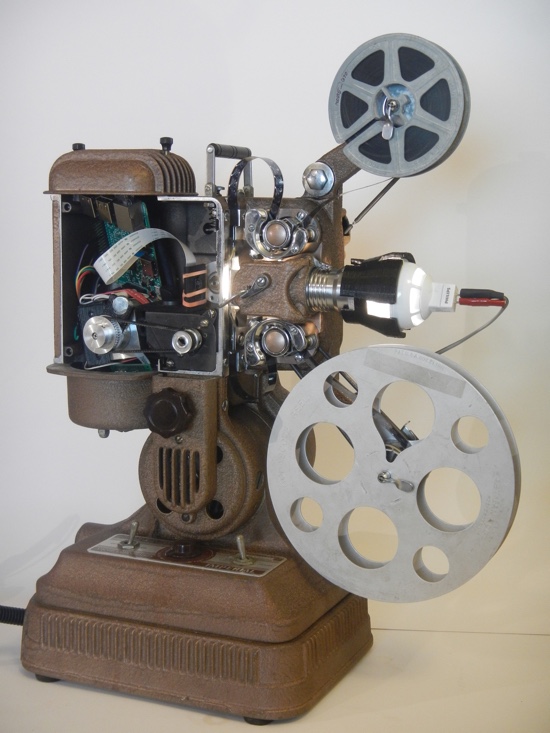A team from Isobar, representing Coca-Cola Sweden, have hit on a cool idea to get people to experiment with Swedish dialects and it uses a Raspberry Pi. The Dialekt-o-maten is situated on a busy high street in Stockholm and challenges visitors to pronounce words in obscure Swedish dialects of which, being a very long country, there are several. If the pronunciation was correct, visitors were rewarded with a Coca-Cola bottle of their choice. The team had to experiment with different filters to block out the noise from surrounding traffic and other people just passing by. The system was originally created on a Mac laptop but was then transferred to a Raspberry Pi. See a promotional video below:
Converting old film reels to digital with a Raspberry Pi
Joe Herman has taken an old film projector, a Raspberry Pi, a camera module and a stepper motor and created a machine that will help to convert 8mm and 16mm film reels into a digital format. He had to re-focus the camera module and he’s used a magnetic reed switch to detect when the frame has been moved on by the stepper motor to trigger the camera to take a photo of that particular frame. The actual processing of the photographic images was done on a more powerful Linux box. He’s written an article over on the IEEE Spectrum website, so head over there to read more. See the results of one of the videos below:
RasPiO Inspiring goes on general sale – Much blinkiness for your Raspberry Pi!
Alex Eames has just tweeted that his LED system, RasPiO Inspiring, has just gone on general sale. There are a number of bundles available, as well as single shapes with or without driver boards, so head over to the RasPiO website to take a look. I hear good things from Alex about some upcoming project blogs which feature the system!
This is a really great system – the shapes are nice and big (not to mention bright!) and the code available for the Raspberry Pi is top-notch. Well worth investing in. And remember: This isn’t just a Pi-compatible system – it’s also possible to use the boards with all the other driver boards in the image above! Lots of possibilities for embedded projects. 🙂
Pi Wars 2018 – venue and date confirmed! – 21st-22nd April
Myself and Tim are delighted to announce that Pi Wars 2018 will take place at the Cambridge Computer Laboratory (William Gates Building) on 21st-22nd April. This is the venue that we have used for the last two events and we are over-the-moon to be able to return there. Many, many thanks are due to the staff and academics at the Lab, without whom we would not have been able to make the booking.
We are still looking for teams to apply to enter the competition. Please bear in mind that you must apply before 12 noon on 3rd October to be eligible!
Remember, there are four categories, within which teams compete against their peers:
- School teams, including kids’ clubs
- Beginners
- Intermediates
- Advanced/Professional
Our intention is to offer much more assistance and mentoring this year, with everyone helping everyone else via an online forum and also via a Discord chat channel. We are also preparing a list of hints and tips for each challenge, and in general, to give teams a head-start on building their robot.
To find out more about the competition, head over to the Pi Wars website and to apply, visit this page and fill in the form.
Egham Raspberry Jam – Sunday, 15th October
Albert Hickey is organising another Egham Raspberry Jam at Gartner HQ. Primarily a Show-and-Tell event, but with plenty of opportunity for newcomers to learn the ropes, the Jam will take place on Sunday, 15th October from 2-5pm. It’s sure to be a great get-together and has a Halloween theme!
New products bonanza for the Raspberry Pi from The Pi Hut
Over at The Pi Hut, they’ve just launched a selection of new products. All designed by Raspberry Pi alumni Rachel Rayns, it’s great to see The Pi Hut produce it’s own unique products, and hopefully there will be even more over time. So, here they are:
- ZeroView Mini – a smaller version of the ZeroView attach-your-camera-to-a-window board – £5.
- Status Board pHAT – a Zero-form-factor board containing 3 white strips that you can write on with a dry-wipe marker and accompanying red and green LEDs to indicate the status of each item – £5.
- Status Board Pro – a larger version of the Status Board pHAT with 5 dry-wipe strips and LEDs as well as space for tactile buttons (available separately) on the end of each strip – £6.
These are all in addition to the fabulous Christmas Tree pre-order announced the other day that has already been vastly successful with over 1200 sold!
Lovely ideas with very practical applications.







